The following resolutions were passed at the CCCC Annual Business Meeting held on Friday, March 15, 2019, in Pittsburgh.
Resolution 1
Whereas Vershawn Ashanti Young invited us to consider, theorize, and practice performance-rhetoric and performance-composition in a call for proposals that broke the rules, enacting performance in the very call to convene;
Whereas Dr. Vay’s own website performs the theorizing he calls us to by understanding and naming his in-person scholarly performances as appearances;
Whereas he has served in various capacities at the secondary and postsecondary level, and he has committed himself to consulting and training teachers to think about language and diversity and to have an awareness of interpersonal and intercultural communications;
Whereas he has challenged members of CCCC to include consideration of performance and communication in our work, moving beyond a focus on writing, and has instilled his passion for multidisciplinarity and inclusivity, cultivating a convention that has reflected how teaching and learning itself is interdisciplinary;
Whereas he blurs the boundaries of language, scholarship, and disciplines in his own work as an artist, scholar, teacher, and attorney; and
Whereas he models for all of us the importance of blending the personal and the professional, refusing to compartmentalize work and family, the academy and the real world;
BE IT THEREFORE RESOLVED that the 2019 Conference on College Composition and Communication thanks Vershawn Ashanti Young for his many contributions to us and to the profession.
Resolution 2
Whereas Brenda Whitney, in spite of the limited support generally afforded non-tenure-track faculty, and members of the Local Arrangements Committee have made significant contributions to support new attendees and returnees and to enhance the convention experience;
Whereas Brenda Whitney and the Local Arrangements Committee created a vibrant, inviting, and comprehensive guide to Pittsburgh that covered the various sections of this reinvigorated steel city and its local history;
Whereas they worked diligently to provide attendees with detailed information about opportunities for shopping, sightseeing, and attending cultural events in the Pittsburgh area, including attention to low-cost options;
Whereas they provided accessibility avenues so that almost every attendee of every ability was able to participate fully in the convention;
Whereas Local Arrangements Committee members were ever-present in the Convention Center helping to guide conference attendees to registration and events, making recommendations for nearby restaurants, and generally welcoming more than 3,000 visitors; and
Whereas Brenda Whitney and the Local Arrangements Committee somehow managed to provide seventy-degree weather in Pittsburgh in March, and created a welcoming Mr. Rogers’s Neighborhood feel for the convention;
BE IT THEREFORE RESOLVED that the 2019 Conference on College Composition and Communication expresses our deepest appreciation to Brenda Whitney and the Local Arrangements Committee by applauding their energy and efforts.
Resolution 3
WHEREAS CCCC has position statements articulating the importance of substantive arguments for faculty in tenure or promotion processes (e.g., community-based research/teaching/service; crediting the work of developing technologies as scholarly contributions; the policy on disability);
WHEREAS non-tenure-track (NTT) colleagues are engaged in many of the same practices, and face many of the same workplace climate issues (e.g., accessibility; bullying; harassment) as tenured/tenure-track faculty; and
WHEREAS the growing cadre of NTT faculty could benefit from organizational support arguing for contract renewals and promotions in much the same way that tenure-track faculty need support arguing for tenure and promotions;
BE IT THEREFORE RESOLVED that:
- CCCC works to include NTT representation on committees and task forces producing and revising position statements;
- CCCC revises current position statements that may facilitate renewal and/or promotion; and
- CCCC generates guidelines for ethical practices of renewal and promotion for NTT faculty.
Resolution 4
WHEREAS CCCC members approved a resolution in 2011 resolving that: (1) CCCC consults with the hotel workers union and other labor organizations to schedule meetings and conferences in hotels and convention halls with fair labor practices or contract with vendors that practice fair labor practices; and (2) CCCC commits to offering housing at convention rates in at least one hotel with fair labor practices at every meeting; and
WHEREAS CCCC has already established policies for responding to hostile legislation at convention locations, as well as protocols for respecting and responding to safety concerns on behalf of members, including strong consideration of moving or canceling the entire 2017 conference;
BE IT THEREFORE RESOLVED that:
- CCCC works with the Labor Caucus to update “CCCC Convention Siting and Hostile Legislation: Guiding Principles” to include language governing labor disputes; and
- CCCC agrees to encourage the Conference Chair, the NCTE staff, and the Local Arrangements Committee to work with the Labor Caucus to increase visibility and availability of labor-friendly local venues, including the provision of a labor-friendly lodging option at convention rates.

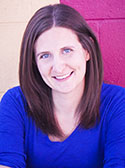 Rachael W. Shah is an assistant professor of English at University of Nebraska–Lincoln, where she teaches graduate and undergraduate courses in community literacy, public rhetoric, and teacher education. Her current book project explores community perspectives of university-community partnerships. Former director of the Wildcat Writers program, she now coordinates a similar program called Husker Writers in Nebraska.
Rachael W. Shah is an assistant professor of English at University of Nebraska–Lincoln, where she teaches graduate and undergraduate courses in community literacy, public rhetoric, and teacher education. Her current book project explores community perspectives of university-community partnerships. Former director of the Wildcat Writers program, she now coordinates a similar program called Husker Writers in Nebraska.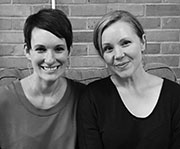
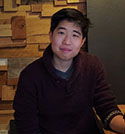 V. Jo Hsu is an assistant professor of English and the associate director of the Program in Rhetoric and Composition at the University of Arkansas. Their research and teaching focus on the interrelations among identity, narrative writing, and struggles for social justice. Their current project examines intergenerational narratives among queer Asian Americans and considers what these archives can teach us about our cultural and academic institutions, as well as how they might help us envision more inclusive pedagogical theories and practices. Jo has yet to find a third-person pronoun that feels entirely like home.
V. Jo Hsu is an assistant professor of English and the associate director of the Program in Rhetoric and Composition at the University of Arkansas. Their research and teaching focus on the interrelations among identity, narrative writing, and struggles for social justice. Their current project examines intergenerational narratives among queer Asian Americans and considers what these archives can teach us about our cultural and academic institutions, as well as how they might help us envision more inclusive pedagogical theories and practices. Jo has yet to find a third-person pronoun that feels entirely like home.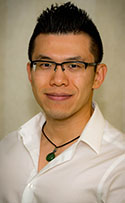
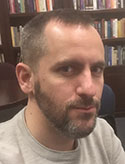
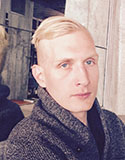 James Rushing Daniel is a lecturer in the Interdisciplinary Writing Program at the University of Washington. His research has appeared in College English, Philosophy & Rhetoric, and Composition Studies, among other venues.
James Rushing Daniel is a lecturer in the Interdisciplinary Writing Program at the University of Washington. His research has appeared in College English, Philosophy & Rhetoric, and Composition Studies, among other venues.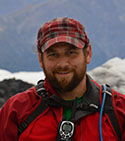 Ira J. Allen is assistant professor of rhetoric, writing, and digital media studies at Northern Arizona University, and formerly assistant professor of rhetoric and composition at the American University of Beirut (where he directed the Writing Center and Writing in the Disciplines). He publishes regularly on rhetoric, democracy, ethics, and writing and has translated works by Nietzsche, Walter Benjamin, and Werner Hamacher, among others. His book The Ethical Fantasy of Rhetorical Theory explores the meanings and utility of rhetorical theory for scholars across the humanistic disciplines.
Ira J. Allen is assistant professor of rhetoric, writing, and digital media studies at Northern Arizona University, and formerly assistant professor of rhetoric and composition at the American University of Beirut (where he directed the Writing Center and Writing in the Disciplines). He publishes regularly on rhetoric, democracy, ethics, and writing and has translated works by Nietzsche, Walter Benjamin, and Werner Hamacher, among others. His book The Ethical Fantasy of Rhetorical Theory explores the meanings and utility of rhetorical theory for scholars across the humanistic disciplines.